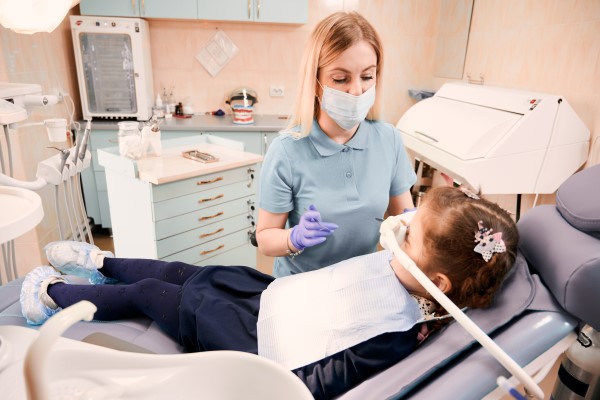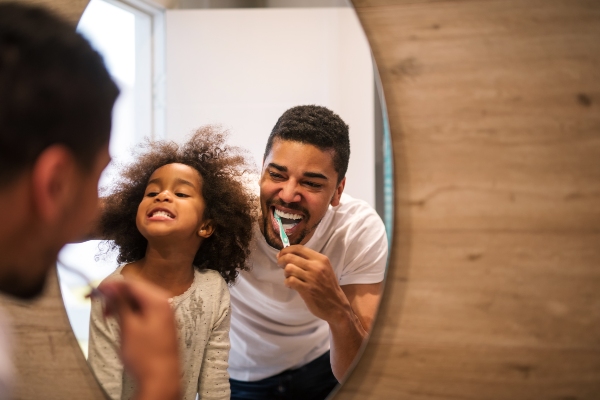What Is Involved in Pain Free Pediatric Dentistry?

Pain free pediatric dentistry makes dental treatments more pleasant for your child. At times, a pediatric dentist might recommend an anesthetic simply because the procedure would otherwise cause pain.
At times, the dentist might recommend a sedative if a child has dental anxiety. Sedatives like nitrous oxide can make dental appointments more pleasant for nervous children. They are also sometimes recommended for complicated procedures that might require a child to stay still for prolonged periods.
Pain free pediatric dentistry options
The American Academy of Pediatric Dentistry updated its guidelines for giving deep anesthesia to children. It states there must be at least two people in the room at all times who are trained on how to perform advanced life support measures. One of these professionals will be the dentist performing the treatment, while the other will be an independent observer, either a dental anesthesiologist, oral surgeon, nurse anesthetist, or physician anesthesiologist. Popular sedatives used during pain free pediatric dentistry include the following.
Nitrous oxide
This is one of the least invasive sedatives used in pain free pediatric dentistry, and it is more commonly known as laughing gas. It is a fast-acting sedative that takes effects within minutes of it being inhaled. The gas will not put a child to sleep, but it will make them feel more relaxed. They might also feel a bit lightheaded and act silly. In rare cases, the child might not enjoy the feelings caused by laughing gas.
Mild sedatives
These are typically recommended for older children and adults who have dental anxiety. These drugs are often taking orally, and they help keep patients relaxed leading up to and during their dental appointments. The child stays awake while under the effects of these sedatives, so they can still follow instructions provided by the dentist as needed.
Moderate sedatives
Moderate sedatives tend to make children feel sleepy, but they are typically conscious enough to follow instructions. Moderate sedatives are better suited for adults than children with dental anxiety. The patient can breathe under the influence of these drugs, and they can be easily woken up. Most children do not remember what happened during their treatments when under the influence of moderate sedatives.
Deep sedatives
These types of sedatives are typically delivered intravenously, and they typically put the child to sleep during their treatment. The child may not be able to breathe on their own when under the influence of deep sedatives, and there must be an independent observer present to monitor the child’s breathing, blood pressure, heart rhythm, and heart rate.
General anesthesia
This puts the child in a state of deep sleep, and they will not feel anything during their treatment. An independent observer must also be present when this level of sedation is being used. The observer will monitor the child and administer medication while the pediatric dentist performs the treatment.
Explore pain free pediatric dentistry
Dental sedatives can make dental procedures more pleasant for your child. Give us a call or visit our Phoenix clinic to set up an appointment with our dentist.
Request an appointment here: https://nettsmiles.com or call Nett Pediatric Dentistry & Orthodontics at (623) 759-7658 for an appointment in our Phoenix office.
Check out what others are saying about our dental services on Yelp: Pediatric Dentist in Phoenix, AZ.
Recent Posts
Regular visits to a pediatric dentist who specializes in young patients are an important part of establishing good oral health practices. Many instances of severe dental conditions in children stem from either a lack of regard for proper hygiene or a lack of knowledge on the proper ways to care for a child's teeth. Check…
Pediatric dental care supports children's health, comfort, and development. Not only does it strive to detect and treat oral health problems early, but it also desensitizes children to dental visits to make each experience more comfortable. This special care and attention can motivate children to take good care of their teeth from a young age.Dental…
Cavity treatment for kids is a chief concern among parents, and for a good reason. Cavities are common in children of all ages. According to the Centers for Disease Control and Prevention, over half of the kids ages 6 to 8 have had at least one cavity in a primary tooth. The good news is…
Pediatric dentistry focuses on the oral problems that occur in children. Many dental issues in kids are similar to those that occur in adults. Without proper treatment, dental problems can progress to misaligned teeth and poor oral health. If you want to maintain your child’s dental health, here are the common dental issues that pediatric…


